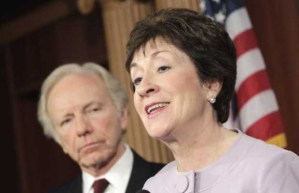U.S. Sen. Susan Collins, R-Maine, announced Tuesday a bipartisan jobs plan that would include additional infrastructure spending and an extension of the payroll tax cut.
The payroll tax was debated in the Senate last week as Democratic and Republican plans to extend the cut for another year failed in procedural votes. Collins voted for both plans. She was the only Republican to vote for the Democratic plan, which would have funded the cut by assessing a surtax on millionaires.
Collins’ vote set her up to be a key player in a bipartisan compromise plan. Details of her proposal with Sen. Claire McCaskill, D-Mo., were released during a joint news conference.
Collins provided a snapshot that includes a jobs plan based on investment in roads and bridges.
Collins, in a press release, said the infrastructure spending and the payroll tax cut extension would be paid for by a surtax on millionaires and eliminating “tax giveaways” to big oil companies. The plan would shield small business owners from the millionaire surtax.
The Democratic plan that most Republican senators rejected last week did not feature that exemption. U.S. Sen. Olympia Snowe, R-Maine, told reporters last week that taxing small business owners was what drove her opposition to the Democratic plan.
Collins told the New York Times that exempting small businesses could be a potential breakthrough in the stalemate.
“One of the primary objections to a surtax on very wealthy people has been its impact on small business,” Collins told the Times. “That concern resonated with me.”
A recent study by the U.S. Treasury Department’s Office of Tax Analysis said the millionaire surtax proposed by Democrats would affect about 1 percent of small business owners.
Collins’ jobs plan includes extending and expanding tax cuts for small businesses and workers.
The proposal would create a $10 billion appropriation to capitalize on an existing program that helps states provide loans, loan guarantees and other forms of non-grant assistance that leverage private dollars.
States would be required to use the funding for state infrastructure. The plan would provide an additional $25 billion in funding for highway and bridge programs.
The handout provided to reporters cited a study by the Federal Highway Administration that showed every $1 billion spent on highway construction supported about 30,000 jobs.
The payroll tax cut would assess a 2 percent surtax on taxpayers earning more than $1 million a year. The tax would end in 10 years, and it would exempt small businesses.
“Americans are frustrated that Washington hasn’t been able to set aside partisan bickering long enough to agree on a realistic path forward to spur job creation and boost our economy,” Collins said in a prepared statement.
“I have been saying for many months that we need to work to reach a consensus on a plan that will help employers create and preserve jobs,” she said. “Ours is a bipartisan plan that would do just that.”

Comments are no longer available on this story